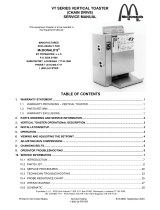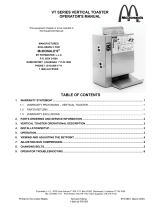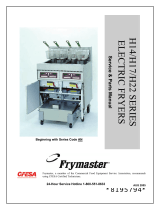
1-8
PROBLEM PROBABLE CAUSES CORRECTIVE ACTION
A. Failed computer.
A. Check for 12VDC on computer pins 6 &
7. If NOT present AND motor is running,
replace computer. Check for 5VDC on
terminals 3 & 4 of main heater relay and
pins 1 and 6 of computer. If NOT present
at either point AND motor is running,
replace computer.
B. Broken/loose wire between computer and
latch relay, or failed latch relay.
B. Check for 12VDC on computer pins 6 &
7. If present and wiring is intact, replace
latch relay.
C. Failed main heater probe.
C. Determine temperature of platen then
measure main heater probe resistance at
pins 3 & 5 of 9-pin connector. If the
probe resistance is NOT approximately
equal to the corresponding resistance in
the chart on Pages 24 and 25, replace the
probe.
D. Broken/loose wire between computer and
main heater relay, or failed main heater
relay.
D. Check for 5VDC on terminals 3 & 4 of
main heater relay AND on computer pins
1 & 6. If present on pins 1 & 6, but NOT
on terminals 3 & 4, and wiring is intact,
replace the main heater relay.
Platen does not heat, but
computer display is on.
E. Failed platen.
E. Check for 5VDC on terminals 3 & 4 of
main heater relay and for line voltage on
terminal 2 of main heater relay and
terminal 4 of latch relay. If expected
voltage is present at all three points,
replace the platen.
Probe Resistance Chart
For use with CT16 Series toasters manufactured with Minco Thermistor probes only.
FOHMSC FOHMSC FOHMSC FOHMSC FOHMSC
60 1059 16 160 1268 71 260 1473 127 360 1674 182 460 1872 238
65 1070 18 165 1278 74 265 1483 129 365 1684 185 465 1882 241
70 1080 21 170 1289 77 270 1493 132 370 1694 188 470 1892 243
75 1091 24 175 1299 79 275 1503 135 375 1704 191 475 1901 246
80 1101 27 180 1309 82 280 1514 138 380 1714 193 480 1911 249
85 1112 29 185 1320 85 285 1524 141 385 1724 196 485 1921 252
90 1122 32 190 1330 88 290 1534 143 390 1734 199 490 1931 254
95 1133 35 195 1340 91 295 1544 146 395 1744 202 495 1940 257
100 1143 38 200 1350 93 300 1554 149 400 1754 204 500 1950 260
105 1154 41 205 1361 96 305 1564 152 405 1764 207 505 1960 263
110 1164 43 210 1371 99 310 1574 154 410 1774 210 510 1969 266
115 1174 46 215 1381 102 315 1584 157 415 1783 213 515 1979 268
120 1185 49 220 1391 104 320 1594 160 420 1793 216 520 1989 271
125 1195 52 225 1402 107 325 1604 163 425 1803 218 525 1998 274
130 1204 54 230 1412 110 330 1614 166 430 1813 221 530 2008 277
135 1216 57 235 1422 113 335 1624 168 435 1823 224 535 2018 279
140 1226 60 240 1432 116 340 1634 171 440 1833 227 540 2029 282
145 1237 63 245 1442 118 345 1644 174 445 1843 229 545 2039 286
150 1247 66 250 1453 121 350 1654 177 450 1852 232 550 2049 288
155 1258 68 255 1463 124 355 1664 179 455 1862 235



























